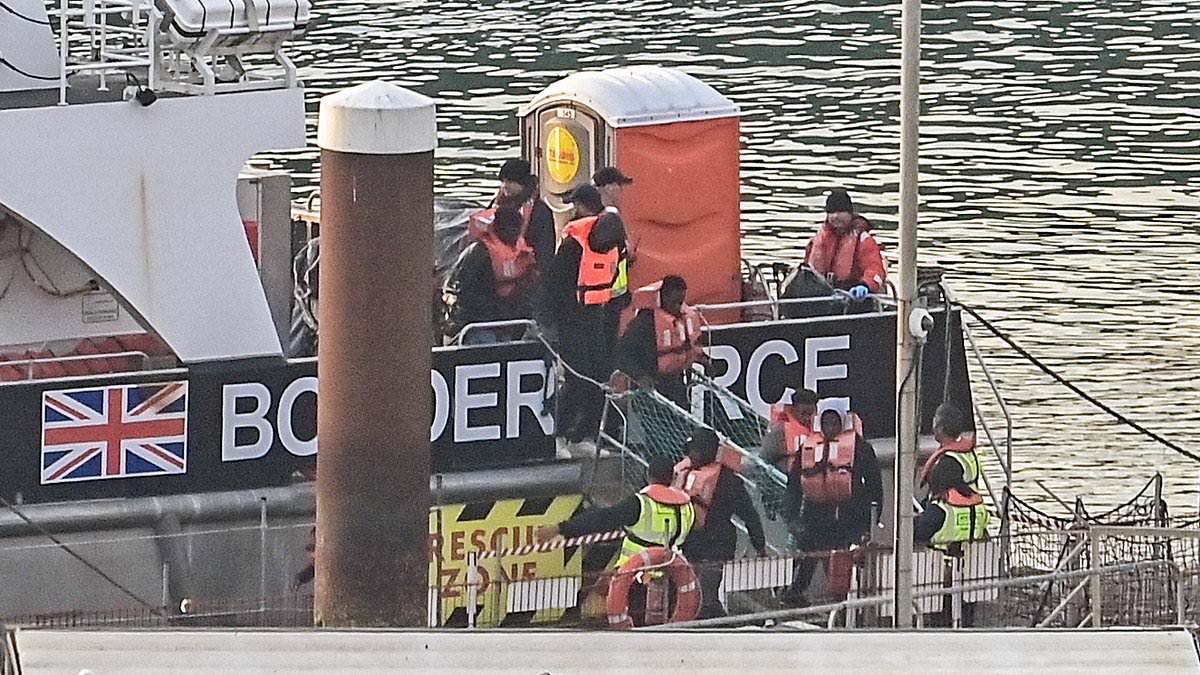Dozens more migrants were intercepted in the English Channel today as the Government warned of a ‘difficult summer’ ahead.
Border Force vessel Hurricane brought the group, who were mainly men, into Dover Harbour this morning before they were taken ashore for processing.
Yesterday, one person died and another 71 were rescued after their dinghy got into difficulties amid windy conditions off the French coast.
It comes at a difficult time for Labour’s illegal migration strategy, with the former general tasked with tackling small boat crossings deciding to quit just days after the start of the new government.
Stuart Skeates, who served in Iraq and Afghanistan, was recruited last April to set up Suella Braverman’s Illegal Migration Operations Command.
He stepped down last Thursday in what the Home Office described as a ‘personal choice’ – dealing a blow to Home Secretary Yvette Cooper as she scrambles to come up with a plan to tackle a surge in crossings.
Labour has scrapped the Tories’ Rwanda scheme and vowed to tackle small boat crossings by creating a new unit, the Border Security Command, which will have ‘enhanced counter-terror powers’ to fight smuggling gangs.
James Cleverly, the shadow Home Secretary, today leapt on Mr Skeates’ departure as evidence this initiative was ‘doomed to fail’.
‘Labour’s Small Boats Command is in disarray,’ he wrote on X.
‘Nobody will take the job on, because they are doomed to fail without our Rwanda deterrent.
‘Top civil servants know this, and so do the people smugglers.’
Mr Skeates sent civil servants two mass emails announcing his departure, according to the i.
One of the emails suggested he would go ‘immediately’, but he is now reportedly expected to stay on for a period to oversee the transition to Labour’s new Border Security Command.
A Home Office spokesperson said: ‘Stuart Skeates is leaving his position of Director General of Strategic Operations. This is a personal choice, and follows 35 years of distinguished public service in the Civil Service and military.
‘The Home Office wishes him well for the future and is grateful for his outstanding contribution.’
The effort to find a candidate to lead the Border Security Command is still underway.
Former Met counter-terror chief Neil Basu had been expected to apply for the £200,000-a-year role, but he is said to have declined because he is ‘no civil servant’.
In the King’s Speech yesterday, Labour said it would give the organisation ‘enhanced counter-terror powers’ to catch and prosecute organised criminals who are bringing migrants into the UK illegally.
The measure has been dismissed as a ‘gimmick’ by Tories, who argue only measures like the Rwanda scheme – which Sir Keir confirmed today has been ditched – were enough to break the smugglers’ business model.
Building on Labour’s manifesto pledges, the King’s Speech said existing policies had ‘failed’ to deter Channel crossings or prosecute the people smugglers responsible, and ‘our current asylum system is broken’.
Withdrawing from the ‘failed and incredibly costly Migration and Economic Development Partnership’ to send migrants to Rwanda would save ‘over £100 million in future payments’, as well as ‘tens of millions of pounds’ in additional relocation costs for a small number of people.
The document setting out the Bill suggests the Government will seek a ‘strong deterrent’ against migrants crossing the Channel but stops short of detailing what this could be in the absence of the Rwanda deal.
It does indicate tougher penalties for immigration crime, including introducing offences such as ‘enabling the advertising (of) the services of a migrant smuggling group’ or those for the ‘supply of materials needed to facilitate organised crime gangs’.
Launching the Border Security Command earlier this month, Home Secretary Yvette Cooper described it as Labour’s first priority on migration, which was designed to crack down on people-smuggling gangs orchestrating the crossings.
A commander for the unit is expected to be appointed in the coming weeks.
It is unclear how this will differ from existing units already operating in the Home Office.
Ms Cooper admitted yesterday that the number of small boat crossings remain at crisis levels as figures showed 427 people made the crossing in seven boats on Monday.
That took the number who have arrived under the new Labour government to 1,185 since July 8.
A Cabinet read-out said: ‘The Home Secretary said that small boats crossings were at a record high in the first half of the year and indicated a difficult summer ahead.
‘Tackling illegal migration was, therefore, an important part of our European reset, where the Government is working with European partners and agencies, including Europol, to tackle criminal gang networks and work to disrupt supply chains and illegal migration upstream.’
The Tories jumped on Ms Cooper’s comments, saying her ‘gimmicks’ for stopping the boats were ‘a waste of time’ and that Sir Keir’s alternative plan puts too much ‘faith’ in the European Union to stop illegal crossings.
On Wednesday evening, French coastguard were alerted to an incident involving a dinghy which deflated in the Channel off Gravelines, France and that people were in the water.
An air and sea rescue operation was launched, involving French lifeboats and wo helicopters as well as British RNLI lifeboats, Border Force and HM Coastguard vessels.
A total of 59 people were taken on board the French rescue ship Cormoran including one unconscious person.
The medical team of the Boulogne-sur-Mer maritime SMUR was winched on oard the vessel to take care of the shipwrecked.
But French Coastguard said: ‘Unfortunately, the unconscious person could not be resuscitated.’
Border Force vessel Ranger picked up 13 people from the water.
All the rescued people are dropped off at the quay in Calais at the beginning of the night and taken care of by the emergency services on land.
A total of 71 people were rescued with one fatality.
